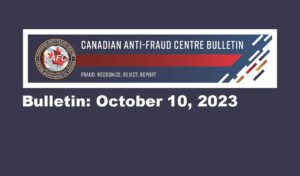
Investment Scams 2023-10-10
This bulletin was prepared to inform the public as a part of the Canadian Anti-Fraud Centre’s (CAFC) campaign for this October’s Cyber Month.
With investment fraud losses totaling $305.4 million, this category represents the highest reported losses in 2022. Typical investment frauds offer get-rich-quick opportunities and higher-than-normal returns. These frauds often result in investors losing most, or all, of their money. The majority of the investment scam reports involve Canadians investing in cryptocurrency after seeing a deceptive advertisement online. Crypto investment frauds typically involve victims downloading a trading platform controlled by fraudsters. After investing and seeing their money grow in the trading account, victims are often unable to withdraw any funds.
Variation: Romance and investment scams
Fraudsters are also targeting victims on dating or social media sites. They will develop a relationship with the victims and convince them to invest in a fraudulent crypto investment platform.
Common methods of solicitation used by fraudsters:
- Search engine optimization
- Compromised social media accounts
- Ads on the internet and social media
- Email or text message
- Direct phone calls from fraudulent crypto investment companies
Warning Signs – How to protect yourself
- Be careful when sending cryptocurrency; once the transaction is completed, it is unlikely to be reversed.
- Be wary of individuals met on dating sites or social media who attempt to educate and convince you to invest into cryptocurrency.
- Canadians need to do their research to ensure they are using reputable and compliant services.
- Proceeds of crime and anti-money laundering regimes around the world create regulatory frameworks that treat businesses dealing in cryptocurrencies as money service businesses
- Prior to investing, ask for information on the investment. Research the team behind the offering and analyze the feasibility of the project
- Some fraudsters will use the name of legitimate companies to lend credibility to the fraud and convince victims to send money. Verify email addresses, URLs, phone numbers and their physical address.
- Verify if the investment companies are registered with your Provincial Securities Regulator or the National Registration Search Tool (www.aretheyregistered.ca).
- If you receive a suspicious or odd investment-related message from a trusted friend, reach out to them through a different means of communication to confirm that it is them.
- Beware of fraudsters asking you to open and fund new crypto accounts, they will direct you to send it to wallets they control – Don’t!
- Question why someone is reaching out to you about an investment offer:
- Is this a conversation I would usually have with an unknown person?
- Does it make sense to invest in an opportunity based on the communication I had?
- Should I feel pressure or urgency when deciding to invest?
WANT TO LEARN MORE?
- CLICK HERE to Learn more tips and tricks for protecting yourself.
HOW TO REPORT A SCAM OR FRAUD
Anyone who suspects they have been the victim of cybercrime or fraud should:
- Report it to their local police and
- Report it to the Canadian Anti-Fraud Centre’s – CLICK HERE to report online
- Call the CAFC toll free number at 1-888-495-8501.


